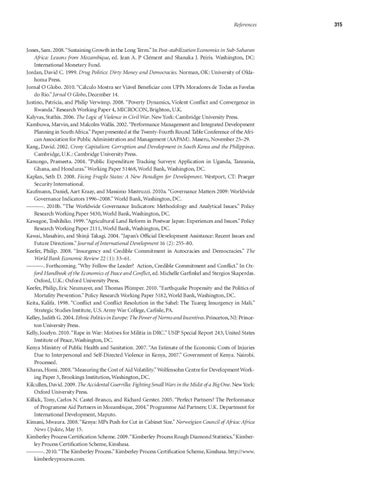References
Jones, Sam. 2008. “Sustaining Growth in the Long Term.” In Post-stabilization Economics in Sub-Saharan Africa: Lessons from Mozambique, ed. Jean A. P Clément and Shanaka J. Peiris. Washington, DC: International Monetary Fund. Jordan, David C. 1999. Drug Politics: Dirty Money and Democracies. Norman, OK: University of Oklahoma Press. Jornal O Globo. 2010. “Cálculo Mostra ser Viável Beneficiar com UPPs Moradores de Todas as Favelas do Rio.” Jornal O Globo, December 14. Justino, Patricia, and Philip Verwimp. 2008. “Poverty Dynamics, Violent Conflict and Convergence in Rwanda.” Research Working Paper 4, MICROCON, Brighton, U.K. Kalyvas, Stathis. 2006. The Logic of Violence in Civil War. New York: Cambridge University Press. Kambuwa, Marvin, and Malcolm Wallis. 2002. “Performance Management and Integrated Development Planning in South Africa.” Paper presented at the Twenty-Fourth Round Table Conference of the African Association for Public Administration and Management (AAPAM). Maseru, November 25–29. Kang, David. 2002. Crony Capitalism: Corruption and Development in South Korea and the Philippines. Cambridge, U.K.: Cambridge University Press. Kanungo, Prameeta. 2004. “Public Expenditure Tracking Surveys: Application in Uganda, Tanzania, Ghana, and Honduras.” Working Paper 51468, World Bank, Washington, DC. Kaplan, Seth D. 2008. Fixing Fragile States: A New Paradigm for Development. Westport, CT: Praeger Security International. Kaufmann, Daniel, Aart Kraay, and Massimo Mastruzzi. 2010a. “Governance Matters 2009: Worldwide Governance Indicators 1996–2008.” World Bank, Washington, DC. ———. 2010b. “The Worldwide Governance Indicators: Methodology and Analytical Issues.” Policy Research Working Paper 5430, World Bank, Washington, DC. Kawagoe, Toshihiko. 1999. “Agricultural Land Reform in Postwar Japan: Experiences and Issues.” Policy Research Working Paper 2111, World Bank, Washington, DC. Kawai, Masahiro, and Shinji Takagi. 2004. “Japan’s Official Development Assistance: Recent Issues and Future Directions.” Journal of International Development 16 (2): 255–80. Keefer, Philip. 2008. “Insurgency and Credible Commitment in Autocracies and Democracies.” The World Bank Economic Review 22 (1): 33–61. ———. Forthcoming. “Why Follow the Leader? Action, Credible Commitment and Conflict.” In Oxford Handbook of the Economics of Peace and Conflict, ed. Michelle Garfinkel and Stergios Skaperdas. Oxford, U.K.: Oxford University Press. Keefer, Philip, Eric Neumayer, and Thomas Plümper. 2010. “Earthquake Propensity and the Politics of Mortality Prevention.” Policy Research Working Paper 5182, World Bank, Washington, DC. Keita, Kalifa. 1998. “Conflict and Conflict Resolution in the Sahel: The Tuareg Insurgency in Mali.” Strategic Studies Institute, U.S. Army War College, Carlisle, PA. Kelley, Judith G. 2004. Ethnic Politics in Europe: The Power of Norms and Incentives. Princeton, NJ: Princeton University Press. Kelly, Jocelyn. 2010. “Rape in War: Motives for Militia in DRC.” USIP Special Report 243, United States Institute of Peace, Washington, DC. Kenya Ministry of Public Health and Sanitation. 2007. “An Estimate of the Economic Costs of Injuries Due to Interpersonal and Self-Directed Violence in Kenya, 2007.” Government of Kenya. Nairobi. Processed. Kharas, Homi. 2008. “Measuring the Cost of Aid Volatility.” Wolfensohn Centre for Development Working Paper 3, Brookings Institution, Washington, DC. Kilcullen, David. 2009. The Accidental Guerrilla: Fighting Small Wars in the Midst of a Big One. New York: Oxford University Press. Killick, Tony, Carlos N. Castel-Branco, and Richard Gerster. 2005. “Perfect Partners? The Performance of Programme Aid Partners in Mozambique, 2004.” Programme Aid Partners; U.K. Department for International Development, Maputo. Kimani, Mwaura. 2008. “Kenya: MPs Push for Cut in Cabinet Size.” Norweigian Council of Africa: Africa News Update, May 15. Kimberley Process Certification Scheme. 2009. “Kimberley Process Rough Diamond Statistics.” Kimberley Process Certification Scheme, Kinshasa. ———. 2010. “The Kimberley Process.” Kimberley Process Certification Scheme, Kinshasa. http://www. kimberleyprocess.com.
315
